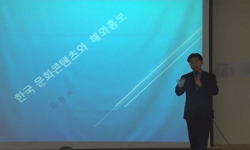In this article, I will focus on filial piety and folklore inside Korean culture. The article is divided into three main parts. Firstly, I will elucidate folklore inside Buddhist tradition which is a fundamental aspect of Korean culture. From the stan...
http://chineseinput.net/에서 pinyin(병음)방식으로 중국어를 변환할 수 있습니다.
변환된 중국어를 복사하여 사용하시면 됩니다.
- 中文 을 입력하시려면 zhongwen을 입력하시고 space를누르시면됩니다.
- 北京 을 입력하시려면 beijing을 입력하시고 space를 누르시면 됩니다.
https://www.riss.kr/link?id=A76378690
- 저자
- 발행기관
- 학술지명
- 권호사항
-
발행연도
2008
-
작성언어
-
-
주제어
한국문화 ; 효 ; 孝 ; 불교문화 ; 유교문화 ; 설화 ; 속담 ; 동물상징 ; Korean culture ; filial piety ; Buddhist culture ; Confucian culture ; folk tales ; proverbs ; animal symbols
-
KDC
300
-
자료형태
학술저널
-
수록면
155-183(29쪽)
- 제공처
-
0
상세조회 -
0
다운로드
부가정보
다국어 초록 (Multilingual Abstract)
In this article, I will focus on filial piety and folklore inside Korean culture. The article is divided into three main parts. Firstly, I will elucidate folklore inside Buddhist tradition which is a fundamental aspect of Korean culture. From the standpoint of Buddhism, just like the sky and the earth, filial piety is considered as the basic principle for every living creature and thus it is the most essential thing in universe. In other words, filial piety is an ongoing affinity between parents and children, and this tie is believed to be delicately connected not only to the previous world but also to the present and the future worlds. Secondly, filial piety is embedded into every day folk culture, in particular, folk tales, proverbs and animal symbols. Folk tales and proverbs concerning filial piety show that the deep and honest devotion to parents will even impress heaven. By emphasizing the fact that also animals tend to serve their father and mother in the animal world, animal symbols stress the importance of filial piety for all human beings. In accordance undutiful persons are regarded as wild beasts. Thirdly, I will show the relation of filial piety and Confucian culture. Especially in confucianism, filial piety is the most elementary source for every activity and behaviour in human society. Confucianism was introduced to Korea from China in the late Koryo dynasty. This philosophy, or more precisely this ethical thinking and activity, has been gradually and systematically developed inside Korean culture. It still remains important today. Hence filial piety is wide spread among Korean people within confucianism. In our contemporary world, due to urbanization and industrialization, past tradition and folk culture seem to loose importance. However, Koreans are keeping their humanity and compassion thanks to the strong sense of filial piety felt by the majority of people in Korea. For the restoration of traditional culture in the 21st century it is time to recover filial piety because filial piety is the core of Korean culture as well as the root of Korean folk culture.
동일학술지(권/호) 다른 논문
-
한국인의 효사상과 효문화 : 동양사상과 인성교육 ; 「공자(孔子)님의 “계지술사(繼志術事)”론(論)」
- 한국청소년효문화학회
- 김영기
- 2008
-
한국인의 효사상과 효문화 : 동양사상과 인성교육 ; 공자님과의 효문답론(孝問答論)
- 한국청소년효문화학회
- 여원구
- 2008
-
한국인의 효사상과 효문화 : 한국인의 효사상과 가치관 ; 효사상과 문화의 현대적 가치
- 한국청소년효문화학회
- 조준하 ( Jun Ha Cho )
- 2008
-
한국인의 효사상과 효문화 : 한국인의 효사상과 가치관 ; 율곡의 효경사상에 내재한 가정문화관과 국정론(國政論)
- 한국청소년효문화학회
- 김익수 ( Ik Soo Kim )
- 2008




 KISS
KISS






